Let’s Know More About Juvenile Diabetes
Juvenile diabetes or simply called diabetes in children is on the rise today. It was earlier believed to be the disease effecting only the elderly. But now it is found in children and younger people as well.
Diabetes – two types – Type 1 and Type 2. In type 1 diabetes, the pancreas does not make insulin while in type 2 diabetes, the body does not make sufficient insulin or does not use the produced insulin effectively. Significantly, type 1 diabetes is more common in children.
The primary cause of juvenile diabetes is genetics. Let’s discuss the symptoms of diabetes in children.
-
Frequent urination
-
Increased hunger and thirst
-
Fatigue
-
Fruity-smelling breath
-
Sudden weight loss
-
Hazy vision
-
Irritability.
Diagnosis
Although symptoms are enough to prove diabetes mellitus in children but for proper confirmation, certain diagnostic tests are recommended by the paediatric diabetologist. So, the question arises, what are the diagnostic tests performed to confirm juvenile diabetes.
The diagnostic tests for diagnosing diabetes in children are as follows:
-
Blood Sugar Test (both fasting and random)
-
Glycated Haemoglobin (A1C) Test
-
Urine Test.
Treatment
Diabetes treatment in children as generally prescribed by the paediatric diabetologist includes the following:
-
Medications
-
Insulin injections
-
Regular monitoring of blood sugar levels
-
Changes in diet and lifestyle.
Prevention
We believe prevention to be always better than cure. Is there any way to prevent diabetes in children? Sure, there are many ways you can prevent your children from getting diabetes. Some of them are as follows:
-
Encouraging them to be more active
-
Feeding them healthy meals
-
Cutting back on their sugar intake.
Getting timely diabetes treatment is vital for your child. Hospitals in Kolkata and Agartala offer Juvenile diabetes treatment from the best diabetologists.
On This Diabetes Day, Let’s Triumph Over Diabetes By Following Some Simple Tips
Living with diabetes is never easy, once you have diabetes there’s nothing you or doctors can do to cure this sad disease. However, you can surely control it by adopting some lifestyle modifications and by getting regular check-ups from a diabetes clinic.
On the occasion of World Diabetes day, let’s take a pledge to beat diabetes against all odds by following these measures:
1. Embrace a diabetes-friendly diet:
There’s a saying, “watch what you eat”, and this is exactly what you need to do if you have diabetes. You should make eating a healthy and properly balanced diet, a significant part of your daily life. Go for foods that regulate your blood sugar levels. Foods that are beneficial for you when you’ve diabetes (either type 1 or type 2) are as follows:
– Fatty fishes
– Eggs
– Leafy Greens like spinach, cabbage, broccoli, cauliflower, etc
– Dry fruits like cashew nuts, almonds, pistachios and walnuts
– Whole grains like brown rice, millet and whole wheat
– Low portions of fruits like strawberries, pears, bananas, apricots, oranges, cherries, guava etc.
2. Eating small and frequent meals:
Skipping your meals is the last thing you want to do if you have diabetes. If you do not want to have large meals, eat small meals frequently to control your blood glucose levels.
3. Shun your sedentary lifestyle:
Living an inactive lifestyle is a strict “no” for people with diabetes, as a sedentary lifestyle leads to serious health concerns like obesity and cardiovascular diseases. Maintaining a healthy weight is your first step to win over diabetes. Certain times, the doctor might suggest bariatric surgery to highly obese diabetic patients. So do include some physical activities of your choice in your life.
4. Abstain from sugary foods:
Diabetics probably know that “sugar” is their worst enemy. Though sounds difficult, you need to abstain from your favourite sweets, chocolates and sugary beverages if you’re dealing with diabetes. Choose sugarfree sweets instead if you have a sweet tooth.
5. Be serious about medications:
Take your medicines on time as prescribed by the doctor to normalize your blood sugar levels.
6. Watch your diabetes:
Keep an eye on your diabetes by getting regular check-ups from a good diabetic clinic. You can always avail our Decoding Diabetes health check up packages.
Do not let your diabetes keep you stressed and distressed. We understand how diabetes can be the worst experience for anyone, so we provide effective diabetes treatment at ILS Hospitals to help our diabetic patients. You are welcome to our hospital for proper diabetes’ diagnosis and treatment.
Diabetes And Its Harmful Effects On Overall Health
Diabetes is a medical condition which is becoming so prevalent around us these days. Until 2-3 decades ago, it was considered to be the old people’s disease, but now, young people are also seeking diabetes treatment. Many diabetes clinics, report having young children falling prey for diabetes as well. Let’s discuss what harmful effects diabetes has if it is left untreated for long or is poorly managed.
1. Slow Healing
Slow healing is the most common condition among diabetic people. Carrying out any invasive medical treatment is very challenging for the same reason. Any minor or major cut, burn, blister, etc does not heal quickly for the diabetic patients. This mostly happens in hands and feet. In rare cases, it can also lead to foot or toe amputation, when it is left untreated over a long period.
2. Kidney Damage
Having kidney failure or severe kidney disease is also a likely scenario in the case of diabetes. The patient might end up needing dialysis regularly or seeking advanced renal transplant.
3. Heart Conditions
Diabetes affects how the heart and its surrounding blood vessels work. As a result, risks of having high blood pressure narrowed blood vessels due to plaque built up is quite common too.
4. Eye Disease And Damage
Diabetes brings many vision-related complications as well. Cataract, glaucoma, eye nerve damage, etc. are some of them. In many cases, it can also lead towards blindness that can only be managed but cannot be cured.
5. Skin Diseases
Diabetes cause dry skin, skin irritation, itching, and many other complications. Moreover, slow healing often leads to cracked skin which in turn brings fungal and bacterial infections.
6. Nerve Damage
Prolonged or mismanaged diabetes causes numbness, tingling sensation in the finger and toes. It damages the foot primarily and the affected area keeps on expanding gradually. When the sensation in the feet gets severely damaged, it leads to a condition called the diabetic foot.
7. Gums And Jaws Condition
Having excessive blood sugar can cause gum disease and loose teeth. Diabetic people often complain of bad breath as well, in spite of maintaining good dental hygiene.
8. Frequent Urination
Diabetes can cause frequent urination as well, but it is more frequent among diabetic patients. Though it is not a life-threatening condition, it does hamper the quality of life and professional life of patients, especially who are engaged in work that requires them to travel a lot, on a daily basis.
Most of the complications of diabetes develop slowly, over the period, but they can be life-threatening as well. Thus it is always advised to every individual to keep an eye on the blood sugar level, from time to time. Moreover, people who are diagnosed with high blood sugar, are advised to keep a check on the other aspects of diabetes and possible complications. ILS Hospitals offer diabetes check-up package that offers immense help to diabetes patients.













